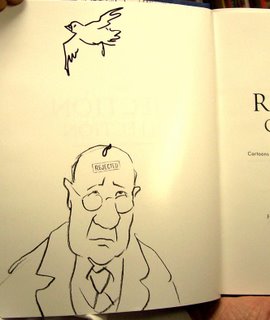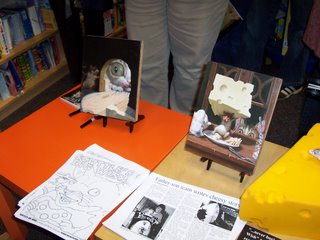Tom Spurgeon linked to this
site which reproduces a State Dept information piece on Satrapi, quoting from her talk at Politics and Prose on Halloween. This struck me as slightly odd, but not inappropriate. She's certainly an articulate advocate for her point of view.
Since works by the US Gov't are in the public domain, here's the
whole piece:
06 November 2006
Book About Wartime Iran a Statement Against Dictatorships:
Graphic novel explains experiences of Iranians during revolution and war
Washington -- Marjane Satrapi’s Persepolis, a four-volume series that first was published in 2000, has become one of the most influential graphic novels in the past 10 years and is a cornerstone of curricula being taught at U.S. universities, including the U.S. Military Academy at West Point, the premier institution for training U.S. Army officers.
The series, which tells the story of Satrapi's life in revolutionary and wartime Iran, has educated and inspired a wide range of readers, including pro-democracy activists from China to Chile.
“Suddenly it became the story of all dictatorships and it put me in a situation that suddenly, despite myself, I became the voice of a generation or the population,” Satrapi said in Washington October 31.
She said she wrote the book to help outsiders understand the Iranian people and their experience during the revolution and war with Iraq, adding that with the current tensions between Iran and the outside world, “there is a lot of need of this book today.”
“This whole work … [was] to try to show the human part of us, to say hey, these people that are so much misjudged, they are human beings exactly like you with family stories, with hopes, and you can identify with them and it might be you today.”
She said a whole generation of Iranians went through this, and now after a period of reflection “it is the right moment” to talk about these events.
Satrapi is among a growing number of women of Persian heritage living in the United States and elsewhere who are seizing upon the opportunity to tell their own stories, taking advantage of new freedoms and an increased feeling of comfort in their new societies. (See related article.)
For more coverage, see Women in the Global Community and The Arts.
(Distributed by the Bureau of International Information Programs, U.S. Department of State. Web site: http://usinfo.state.gov)
and here's a
second article from the same session:
06 November 2006
Iranian Women in Exile Finding Voices Through Literature: Lack of censorship spawns creative outlet for women to tell their own stories
By Stephen Kaufman
Washington File Staff Writer
Washington -- Women of Persian heritage living in the United States and elsewhere are seizing upon the opportunity to tell their own stories, taking advantage of new freedoms and an increased feeling of comfort in their new societies, and the literary world in turn has begun to respond with interest.
Persis Karim, associate professor of English and comparative literature at San Jose State University in California, said that in the past five years to six years there has been “an explosion” of memoirs written by women of Iranian heritage that discuss the loss and nostalgia from having to leave their home country, as well as taboo topics such as sexuality and love.
Speaking at the University of Maryland November 2, Karim attributed the surge of activity in the United States to “a real desire for people to narrate their own story, and a curiosity on the part of Americans -- readers and publishers -- to know something about Iranian women in particular.”
Women in the Iranian Diaspora are “remak[ing] themselves anew,” and Karim said they feel more of an urgency than men to represent themselves to the outside world. She said this stems in part from a reaction to the media’s depiction of Iranian women concealed by veils and seemingly without a voice. But they also want to represent themselves “because they, in some ways, never had that opportunity.”
Karim said the freedom in the Diaspora to write without censorship “is a really important part” of the new wave of literature, and in her compilation, Let Me Tell You Where I Have Been, she includes poems and stories by women written without the knowledge or approval of their families, including topics that explore wide-ranging sexual themes that are typically restricted in Iran’s conservative, traditional culture.
“[W]hat’s exciting and interesting about it is people are writing about sexuality and marriage and love in ways that are very difficult, particularly at the present moment, to write about in Iran,” she said. “It’s a very interesting moment in terms of the literature.”
These women are asking “hard questions about American culture and about Iranian culture,” and Karim said “they’re willing to do it in writing and I think obviously, with the issue of censorship not being there, it affords them some of those opportunities.”
PATRIARCHAL CULTURE SEEN AS INHIBITING DEMOCRACY
Marjane Satrapi, a graphic novelist living in France, has achieved tremendous international recognition, especially for her book, Persepolis, which tells the story of her life in revolutionary and wartime Iran. (See related article.)
Her book Embroideries concerns the situation of women and the topic of sex in Iran, which she describes as “a big taboo in any country in which you don’t have democracy.” Satrapi was speaking in a Washington bookstore October 31.
Among other themes in Embroideries, she discusses the issue of virginity and the cultural importance and pressure that it places on women.
“[It] is the first key to the open door of freedom and democracy because until this problem is solved, of course we cannot talk about democracy,” she said, explaining that she was seeking to discuss “in a nonaggressive way” the right of women to enjoy sexual gratification.
“I really certainly believe that the biggest enemy of democracy is the patriarchal culture,” Satrapi said. Authoritarian and oppressive leaders cannot stop democracy, she argued, but the culture can. In many countries, “half of the society is repressed by the other half of the society,” and it is often enforced through popular notions that women are less intelligent than men or are too sensitive by nature to accomplish what men can.
Democracy is “an evolution,” she said. In Iran, although women “have half of the rights of the men,” 70 percent of Iranian students are women. Satrapi suggested change could occur when educated women become economically independent, but until then “our government is really not representative of us.”
LIFE IN EXILE CREATES BOTH NOSTALGIA AND CREATIVE OPPORTUNITIES
Karim said Iranian Americans are beginning “to write themselves back into the narrative” of the recent events in Iran, and their work is marked by a confidence in English language expression.
“What I see coming through in the writing is a real attempt to grapple with how one situates oneself between that culture in Iran and the United States and/or other countries,” she said. Many younger Iranian Americans are claiming their cultural heritage, but are “also recognizing that they do stand outside of it to some degree.”
Simultaneously, she said, there is “a whole generation of young people growing up in the United States who are influenced and interested in Iranian culture and who are trying to find ways to address that interest.”
Karim said life in the United States, a country of immigrants, has created what she termed “hybrid literature.” The situation of living in a new place gives space for people to “reinvent themselves and maybe revisit their traditions and create new bodies of knowledge based on the experience of immigration.”
It also creates room to depart from the burden of tradition, addressing the writers’ desire to “create something new, with a new language, [and] a new experience.”
Literature by Iranian-American women is also “part of a conversation that’s much bigger than just the United States,” she said, because Iranians now are living all over the world.
“I think that that inability to comfortably go back to Iran without problems or concerns, or feeling somewhat cut off from that ability to have regular engagement with the culture … makes people want to talk about it and write about it and see themselves in some relationship to it,” she said.
For more information, see Women in the Global Community and The Arts.
(The Washington File is a product of the Bureau of International Information Programs, U.S. Department of State. Web site: http://usinfo.state.gov)






 And mine - Duck!
And mine - Duck!























